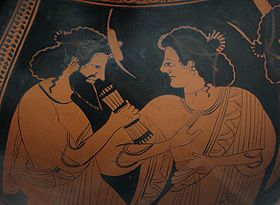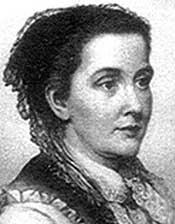Second Sunday in May
Mother of Hermes! and still youthful Maia!
May I sing to thee
As thou wast hymned on the shore of Baiae?
When the 22 year-old Keats wrote the beginning of his “Ode to Maia,” he had been an orphan for eight years. He was traveling to the seaside town of Teignmouth for the spring, to take care of his brother Tom, who was dying of tuberculosis—the same illness that took their mother and would later take Keats himself.
The first several lines of Keats’ ode were recorded in a letter to a friend: “I wrote them on May-day and intend to finish the ode all in good time.“
The ‘good time’ never came. Keats died three years later. The poem was never written.
In Keats’ day it was well-known that May was named for the Greek and Roman goddess of spring, the eldest sister of the seven Pleiades and the mother to Hermes/Mercury by father Zeus/Jupiter. She was also trusted by the philandering Zeus to be his son Arcas’s wet-nurse when his jealous wife Hera turned Arcas’s biological mother into a bear.

Some say our own tradition for dedicating a day to mothers comes out of Maia’s Roman feast. Her day was on the 15th, the Ides (full moon) of the month. Her name not only meant mother, but also “increasing”, referring to the abundance of flora and fauna in spring. (Likewise, the Angles and Saxons called the month “Tri-milchi”, because they could start milking their cows three times a day due to the plentiful grass.)
In other parts of the world, particularly the Middle East, Mother’s Day is celebrated closer to the vernal equinox, while in the U.K., “Mothering Sunday” is celebrated on the Sunday three weeks before Easter, usually in March. Beginning in the 1600s, employers would traditionally give servants the fourth Sunday of Lent off allowing them to attend services at their “mother church”. Mothering Sunday became synonymous for family reunions.
Mother’s Day in America
Mother’s Day in the United States is largely the work of two women. Julia Ward Howe and Anna Jarvis.

Julia Ward Howe was the abolitionist famous for turning the lackluster lyrics of “John Brown’s Body” into the “Battle Hymn of the Republic.” After the Civil War Howe changed her tune–or lyrics actually–to focus on on the women’s suffrage movement and the creation of a “Mothers’ Day for Peace” (note the apostrophe). During the Franco-Prussian War she spoke in London and Paris, and brought the idea of a Mothers’ Day for Peace back home to Boston. The holiday, which she envisioned would be celebrated in June, didn’t get much further than New England, but her Mothers’ Day Proclamation of 1870 stirred women across the country:
“Arise then…women of this day! Arise, all women who have hearts! Whether your baptism be of water or of tears! Say firmly: “We will not have questions answered by irrelevant agencies, our husbands will not come to us, reeking with carnage, for caresses and applause. Our sons shall not be taken from us to unlearn all that we have been able to teach them of charity, mercy and patience. We, the women of one country, will be too tender of those of another country to allow our sons to be trained to injure theirs.”
“…Blood does not wipe our dishonor, nor violence indicate possession.
As men have often forsaken the plough and the anvil at the summons of war, let women now leave all that may be left of home for a great and earnest day of counsel. Let them meet first, as women, to bewail and commemorate the dead. Let them solemnly take counsel with each other as to the means whereby the great human family can live in peace…”
Her vision of Mothers’ Day was one of maternal cohesion, women coming together to work for social justice.
But Mother’s Day as we know it—a day on which children celebrate and honor their own mothers—bears more in common with the vision of a West Virginian by the name of Anna Jarvis…
continued: Anna Jarvis — Mother’s Day in America

Last Friday, May 9, our friend in South Carolina went to his county seat to settle a problem with his driver’s license and waiting for three hours with eight other people in vain as the office was closed for Confederate States of America holiday. You should include this in your blog as a public service.
I will Janis! Thanks, hadn’t heard of that one. Although I do know that Arkansas celebrates Robert E. Lee Day the same day as Martin Luther King Day.
Happy Mother’s Day to all.:*.